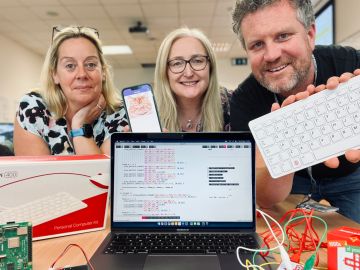A computing camp aimed at second level students was held on 25 & 26 May at SETU Waterford.
Students from schools across the region attended this two-day workshop where they engaged in both fun and practical computing exercises such as coding a website and programming animations.
The camp was led by three lecturers from SETU Waterford Campus: Siobhan Drohan, Amanda Freeman-Gater and Rob O’Connor.
“There are a huge number of well-paying jobs in IT that are unfilled. Despite healthy student numbers in SETU, we’re not producing enough graduates to meet the demand,” said Rob O’Connor. “Hopefully camps like this will encourage more young people to study computing in college. Fingers crossed anyway!”
Each student received a Raspberry Pi 400 computer at the start of the first day. They were introduced to the Linux operating system in the morning session and learned about different software platforms. In the afternoon, the students carried out web development exercises using HTML and CSS.
On the morning of the second day, they were introduced to the Python language using the Processing environment to conduct some animation exercises. “Using visual environments like Processing is particularly good for people new to programming as they see the outcome straight away, the link is immediately made between code and result,” said Siobhan Drohan.
During the second afternoon session, the students were offered a choice of activities: hardware programming using Makey-Makey kits and Microbit programmable boards, mobile app development using MIT’s App Inventor platform, or audio programming using the Sonic Pi environment. To cap things off, the students hacked a Minecraft world using some of the Python skills they learned during the camp.
The students kept their Raspberry Pi 400, to continue their exploration of computing at home. The camp was funded by the Higher Education Authority (HEA) and follows a long tradition of computing initiatives aimed at secondary school students in Waterford.
Gender balance was a core goal for the camp. Despite efforts to ensure a 50/50 split, only 35% of the students were female. This reflects an international problem in encouraging girls to take up ICT and STEM careers. Amanda Freeman-Gater elaborated, “There are huge opportunities in this sector for female students. Unfortunately, there’s a gender imbalance in computing and too few women are joining the industry. We’re trying to get the message out to girls’ schools that there are tremendously rewarding careers in computing to be found, both in terms of salaries and societal impact.”
On a positive note, the female students who joined the course were extremely enthusiastic and it is hoped initiatives such as this Computing Camp will encourage more girls to consider computing.
The feedback from the students was that it was a great opportunity to sample Computer Science as a subject for the leaving certificate. One student was unsure whether they wanted to study Engineering or Computer Science when they finished school. At the end of the two days, this student decided that they would like to do both and is now planning to apply for a degree on the Internet of Things, which combines both areas.
SETU would like to acknowledge the HEA for funding the camp under their ICT Action Plans initiative, which aims to provide education and training pathways for people to learn and upskill in a variety of high-level ICT Skills to meet demand and to ensure the continued growth of the Irish economy.


